
The University of Mumbai is a collegiate, state-owned, public research university in Mumbai.
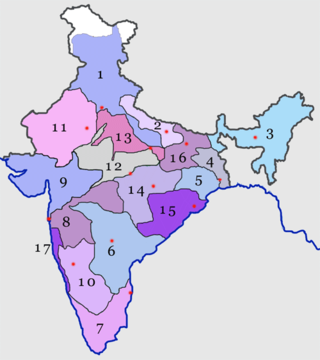
The South Central Railway is one of the 19 zones of Indian Railways. The jurisdiction of the zone is spread over the states of Telangana, Maharashtra, Karnataka, Andhra Pradesh. It has three divisions under its administration, which include Secunderabad, Hyderabad and Nanded. It was re-organized in 2019 and the divisions of Vijayawada, Guntur and Guntakal railway divisions were separated to form South Coast Railway zone. Secunderabad railway station is the current headquarter and Arun Kumar Jain is the present general manager of the zone.

Lonavala is a hill station town and a Municipal Council in the Pune district, Maharashtra, India. It is about 64 km west of Pune and 96 km to the east of Mumbai. It is known for its production of the hard candy chikki and is also a major stop on the railway line connecting Mumbai and Pune. From the Pune suburbs, local trains are available from Pune Junction. Both the Mumbai-Pune Expressway as well as the Mumbai-Bengaluru highway pass through Lonavala.

The Mumbai–Pune Expressway is India's first 6-lane wide concrete, access-controlled tolled expressway. It spans a distance of 94.5 km connecting Mumbai, the capital of Maharashtra state and the financial capital of India, with Pune, the cultural and educational capital of Maharashtra. The expressway, which was fully operationalized in 2002, introduced new levels of speed and safety in automobile transportation to Indian roads. It is one of India's busiest roads.
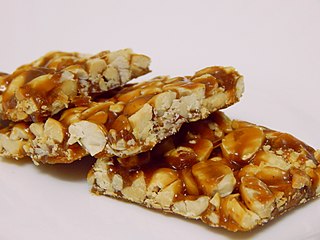
Chikki is a traditional Indian sweet (brittle) generally made from nuts and jaggery/sugar. There are several different varieties of chikki in addition to the most common groundnut (peanut) chikki. Each variety of chikki is named after the ingredients used, which include puffed or roasted Bengal gram, sesame, puffed rice, beaten rice, or khobra, and other nuts such as almonds, cashews and pistachios.
The Department of Biotechnology (DBT) is an Indian government department, under the Ministry of Science and Technology responsible for administrating development and commercialisation in the field of modern biology and biotechnology in India. It was set up in 1986.

Irani cafés are Iranian-style cafés in the Indian subcontinent. They were originally opened by Zoroastrian Irani immigrants to British India in the 19th century, fleeing Safavid persecution or looking for better economic prospects. In India, Mumbai, Pune and Hyderabad boast a number of Irani cafés, which are very popular for Irani chai (tea). In the 1950s, there were 350 Irani cafés; today, only 25 remain. Karachi, Pakistan, was also home to many Irani cafés.
The Ministry of Ayush, a ministry of the Government of India, is responsible for developing education, research and propagation of traditional medicine systems in India. Ayush is a name devised from the names of the alternative healthcare systems covered by the ministry: Ayurveda, Yoga & Naturopathy, Unani, Siddha, Sowa Rigpa, and Homeopathy.
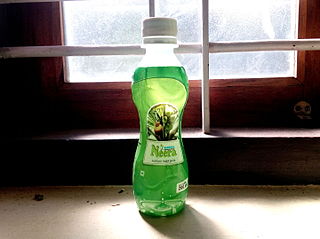
Neera, also called palm nectar, is a sap extracted from the inflorescence of various species of toddy palms and used as a drink. Neera extraction is generally performed before sunrise. It is sweet, translucent in colour. It is susceptible to natural fermentation at ambient temperature within a few hours of extraction, and is also known as palm wine. Once fermented, Neera becomes toddy. Neera is widely consumed in India, Sri Lanka, Africa, Malaysia, Indonesia, Thailand, and Myanmar. Neera is not the juice made from palm fruit.

Expressways are the highest class of roads in India. As of March 2023, India has a total length of 4067.27 km (2,527.719mi) of expressways. These are controlled-access highways where entrance and exits are controlled by the use of ramps or interchange or trumphet that are incorporated into the design of the expressway and designed for maximum speed of 120 km/hr, whereas National highways are flyover access or controlled-access highway, where entrance and exit is through the side of the flyover, at each intersection of highway with road, flyovers are provided to bypass the city/town/village traffic and these highways are designed for speed of 100 km/hr. Some roads are not access-controlled expressways, but are still named as expressways, such as the Biju Expressway, these are actually state highways which are not declared by central government as an Expressway, hence not an Expressway or National Highway. Mumbai–Pune Expressway is the first 6-lane operational expressway in India started in 2002. Expressways follow standards set by Indian Roads Congress and Bureau of Indian Standards.
Kundala Valley Railway was the first monorail system in India, later converted to a 2 ft narrow-gauge railway, that operated in Kundala Valley, Munnar of Idukki district in Kerala, India. The railway line had 35 km length.
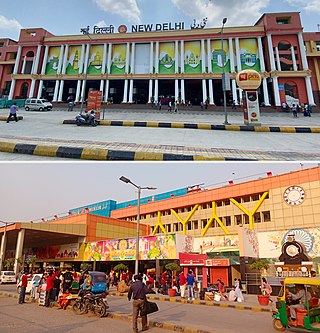
New Delhi railway station is the main railway station in Delhi. Platform 1 is located at Paharganj and platform 16 opens up on to the side of Ajmeri Gate. The station is about two kilometres (1.2 mi) north of Connaught Place in Central Delhi. It is one of the busiest railway stations in the country in terms of train frequency and passenger movement.

Tiruvalla railway station is a railway station located at Thiruvalla town in Pathanamthitta district, Kerala, India. The station is under Thiruvananthapuram railway division of Southern Railway. It is an NSG 4 category station and has daily trains to cities like Thiruvananthapuram, Kochi, Kozhikode, Mangalore, Bangalore, Coimbatore, Madurai, Chennai, Hyderabad, Tirupati, Pune, Bhopal, Mumbai and New Delhi.
Startup India is an initiative of the Government of India. The campaign was first announced by Indian Prime Minister, Narendra Modi during his speech on 15 August 2015.
Transport in Visakhapatnam is the network of roads, railways, rapid transit system in the largest city of Andhra Pradesh. The city of Visakhapatnam also serves as the central hub of transport and logistics on the East coast of India and hence it is called as City Of Destiny.
The Red Ink Awards, also known as the Red Ink Awards for Excellence in Indian Journalism, are a set of annual awards given by the Mumbai Press Club in India to recognize excellence in journalistic achievements as assessed by a special jury. Instituted in 2010, the award grants national recognition to journalists by a professional body.

Indian migrant workers during the COVID-19 pandemic have faced multiple hardships. With factories and workplaces shut down due to the lockdown imposed in the country, millions of migrant workers had to deal with the loss of income, food shortages and uncertainty about their future. Following this, many of them and their families went hungry. Thousands of them then began walking back home, with no means of transport due to the lockdown. In response, the Central and State Governments took various measures to help them, and later arranged transport for them. 198 migrant workers died due to the lockdown, with reasons of road accidents.
Revati Mohite Dere is a judge in the Bombay High Court, India. She has written a number of significant judgments in relation to criminal procedure and police investigations in India, including cases concerning press freedom to report on criminal trials, death penalty sentences for repeated offences, and accountability within the police for false and improper investigations.
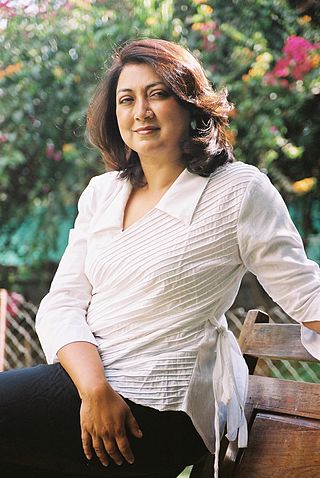
Karen Anand is an Indian food writer, television personality, and restaurant consultant. Anand founded Karen's Gourmet Kitchen, a gourmet food company; and Markets by Karen Anand. She has authored 20 books and hosted three television shows.













